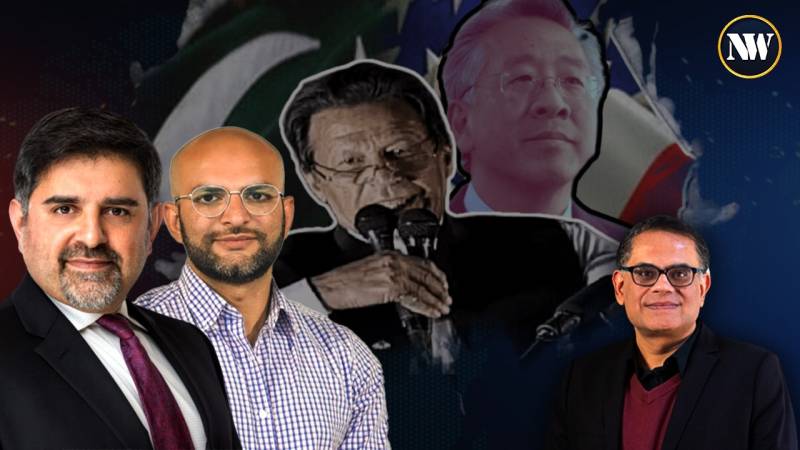A leaked cipher has ignited a storm of speculation and debate, shedding light on the intricate web of U.S.-Pakistan relations and the political dynamics at play. The cipher, allegedly sent by Pakistan's ambassador to the U.S., hints at discussions involving Pakistan's former Prime Minister Imran Khan and potential leadership changes. This development has prompted experts to delve into the authenticity of the cipher, the impact it might have on U.S.-Pakistan ties, and the broader implications for Pakistan's domestic political landscape.
At the heart of this discussion lies the notion that the United States wields the power to orchestrate regime changes in Pakistan at will. However, experts quickly dispel such conspiracy theories as an inflated understanding of U.S. capabilities. Kamran Bokhari, the Senior Director at Newlines Institute argues that this perspective fails to recognize the complexity of U.S. foreign policy decisions and the multitude of factors that influence them.
In reality, U.S. foreign policy is driven by national security interests and strategic considerations. The U.S. engages with foreign countries based on its own priorities, aligning its actions with its global objectives. Uzair Younas, Vice President at The Asia Group, underscores the point that the U.S. carefully selects its battles and interventions, usually avoiding meddling in the internal affairs of sovereign nations unless it serves its strategic goals.
Imran Khan's history of criticizing U.S. policies, especially related to the war on terror and Afghanistan, has contributed to tensions. His rhetoric and actions, like calling Osama bin Laden a martyr, have further strained relations. Additionally, the Biden Administration's focus on global issues like China and Russia might overshadow Pakistan's relevance in their priorities. It's important to note that the U.S. has historically been cautious about engaging in regime change conversations, especially through ambassadors. Imran Khan's personal opinions might not be of primary concern to the U.S., especially given the complex geopolitical landscape. The alleged conversation doesn't seem to fit the modus operandi of covert interventions.
The conversation sheds light on Pakistan's complex domestic landscape, highlighting its inherent challenges and fragility. Younas and Bokhari both note that Pakistan grapples with a myriad of internal and external issues, making it a delicate environment to navigate. The U.S., as a global actor, is concerned about maintaining stability and avoiding actions that could exacerbate an already tenuous situation.
The interview turns its attention to the efforts of Pakistan's ruling party, Pakistan Tehreek-e-Insaf (PTI), to secure U.S. involvement in its favor. PTI has sought U.S. support through requests for criticism of human rights abuses or financial assistance. However, the experts highlight that U.S. decisions are driven by its own interests and may not align with PTI's expectations.
The discussion delves into potential consequences arising from the leaked cipher. The experts speculate that if Pakistan's internal situation worsens, it could trigger heightened U.S. scrutiny and engagement. However, they caution that predicting U.S. actions remains a challenge due to the ever-evolving nature of Pakistan's political landscape.
Amid these discussions, a common theme emerges i.e. the delicate balance between U.S. interests and Pakistan's internal dynamics. The experts argue that Pakistan's political narrative, often characterized by anti-U.S. sentiments, can create a scenario where seeking U.S. involvement becomes paradoxical. While Pakistan's leaders may utilize such rhetoric for domestic political gains, it may hinder constructive engagement with the U.S. when needed. These shifting narratives within add further layers of intrigue; the juxtaposition of PTI's appeals for U.S. intervention with its earlier anti-American rhetoric underscores the challenges of maintaining consistency in a turbulent political climate. Such oscillations reveal the delicate dance political actors often engage in, attempting to balance domestic agendas with international relationships. The assumption that the United States possesses the ability and willingness to intervene in Pakistan's domestic affairs rests on a simplified understanding of the scope and limits of U.S. influence. As several experts pointed out, the U.S. has its own complex array of interests and priorities that shape its engagements with Pakistan, often defying simplistic categorizations.
Ultimately, while the leaked cipher may not directly alter the course of U.S.-Pakistan relations, its ripple effects are already being felt. The emergence of this conversation places both governments under a microscope, prompting them to navigate a delicate path in their interactions. Furthermore, it highlights the increasing scrutiny of Pakistan's democratic backsliding, human rights concerns, and media restrictions, which may eventually lead to stronger calls for action within U.S. political circles.

